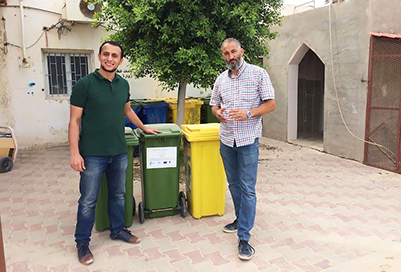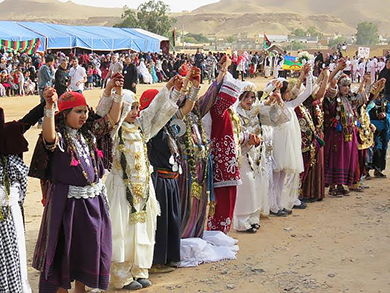

‘With CILG and VNG International, I discovered the experiences of other countries and saw how women can participate effectively and equally in local decision-making.’
Ms. Zitouna Moammer Soltane,
former elected member of the municipality
‘VNG is very supportive of municipalities in Libya, and I have learned a lot from working with its experts and participating in its training. VNG is the only organisation in Libya that understands the future will only get better through good local governance.’
Mr. Ahmed Mataoua,
city council member Nalout
‘Through (…) mediation trainings, I learned how to listen to the other person, how to communicate. I now have a better understanding on peace and I am more convinced of its necessity, and I totally reject violence and armed conflict.’
Mr. Mohammed Hatouich,
member of the military committee
of Zinten
‘Over the last week, we discussed the problems in Libya among us mayors and decided that what Libya really needs is reconciliation; and that we will start to embark on reconciliation through the municipalities as soon as we are back in Libya’
Mr. Husien Atia,
mayor of Tajoura during a study visit to the Netherlands
Also see:
The Libya International Peace Forum
Centre for Innovative Local Governance (CILG)
City development strategies:
Videos:
Women and Development in Libya and Tunisia: Participation, Leadership and Empowerment
Sabria Zorgani from Libya and Fairouz Ben Jemaa from Tunisia
The International Conference on Decentralized Cross Border Cooperation
Dealing with Conflict, Fragility
and Migration by strengthening
local government
Featured Project
Libya, Local Governance and Stabilization Project
Since 2015, VNG International and the Centre International de Développement pour la Gouvernance Locale Innovante (CILG) are implementing the Libya Local Governance and Stabilisation Project (LGSP), funded by the European Union and co-funded by the Dutch Ministry of Foreign Affairs. The project aims to contribute to strengthening and empowering local governments in Libya, which have come to play an increasingly important role due to the lack of a unified central government. By aiming at improved local governance, LGSP seeks to benefit stabilisation and create conditions for future reconstruction and reconciliation. The project focuses specifically on three dimensions of local governance: management, service delivery and citizen participation.
Despite the difficult and extremely challenging operational context, VNG International has been successfully carrying out activities in Libya, involving 25 municipalities in our activities, trainings and pilot projects. Central to our approach in Libya is to facilitate local initiatives and respond to Libyan demands, exemplified by the project’s support to a number of pilot projects that are tailormade to the involved municipalities’ needs.
LGSP employs a combined approach of producing concrete and tangible results through the implementation of pilot projects, and facilitating institutional strengthening and capacity building of local actors by providing trainings, workshops, guides, research reports and study visits.
Results include:
- We organised the “Libya International Peace Forum” in 2017 which facilitated exchange and dialogue between peacebuilding initiatives in Libya at the local, regional and international level. Participants from Libyan municipalities, national and international stakeholders and representatives of CSOs focused on peacebuilding came together to highlight achievements, identify challenges and discuss their ideas to further support Libyan local governments in peace processes.
- We organise trainings for Libyan officials on communication, advocacy, lobbying, preparing job descriptions, strategic municipal planning and more.
- We organise study visits from Libyan mayors and local councillors to the Netherlands in order to facilitate exchange and provide concrete examples in line with themes of pilot projects being implemented in Libya, such as public space management, participatory planning, solid waste management, and local economic development.
- We developed several guides, such as the Youth Leadership Guide to help young municipal councillors and CSO members take the right leadership steps, and the Guide on Strengthening Women’s Leadership in Libya which presents guidelines on how to further women’s emancipation in public life.
- We place emphasis on cross-border cooperation with Tunisian municipalities, which allows for exchange of experiences and continued improvement through sharing of know-how and best practices.
Pilot projects:
- In Zouara, we delivered a medical incinerator to the Environmental Sanitation Office, a first step in the establishment of a medical waste sorting system in the municipality.
- In Tripoli, we launched a Geographical Information System (GIS), helping local governments to make evidence-based decisions with the use of maps and data rather than politically or socially motivated decisions, increasing local government accountability.
- In Zolten, we opened a Centre for Women and Child, where we created a space to develop the capacities of women and children in various fields, and simultaneously helped women integrate into the local labour market by providing them with trainings.
- In Janzour, Barak Chatti and El Gordha, we developed City Development Strategies, aimed at strengthening the municipality’s ability to identify future projects and prepare a strategic vision for urban development.
- In Tripoli, Ghariane and Tarhouna, we developed Urban Databases which provide accurate geographical data and help municipalities with local management and planning.
- In Zinten, we implemented a Municipal Waste Management Plan, which aids the municipality in dealing with its waste and simultaneously encouraged citizen participation by raising awareness on environmental protection and their role in achieving this.